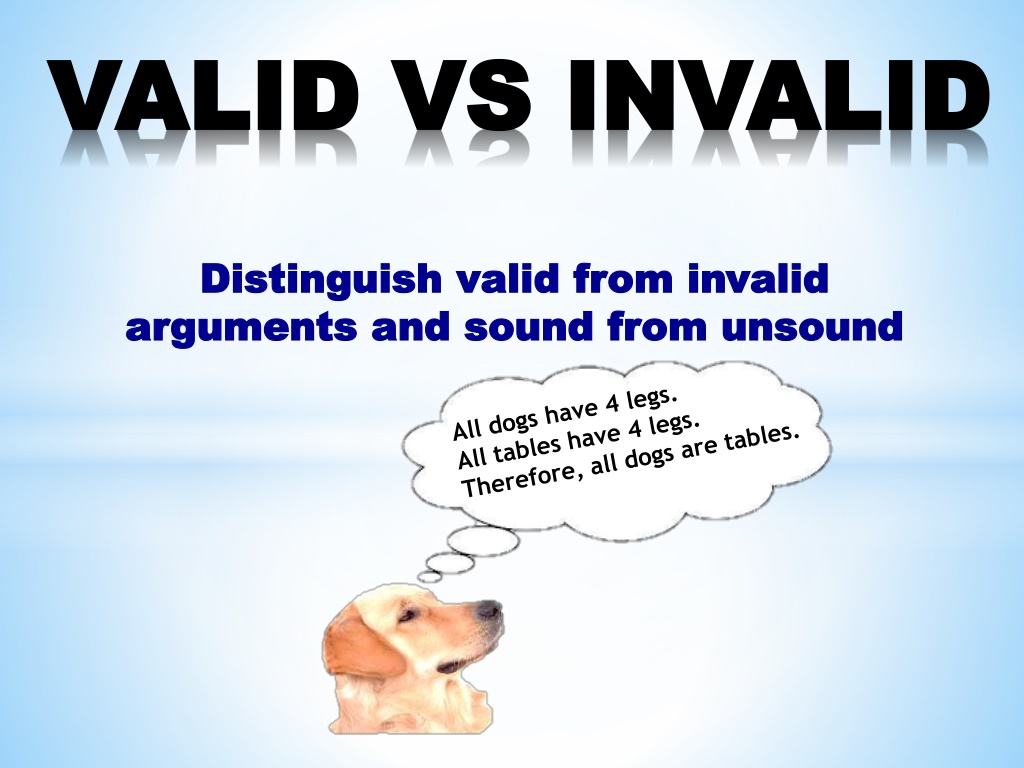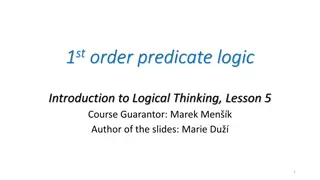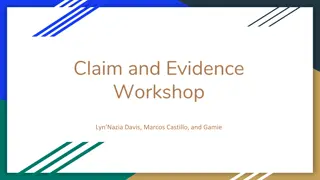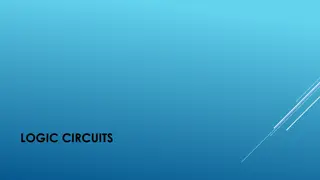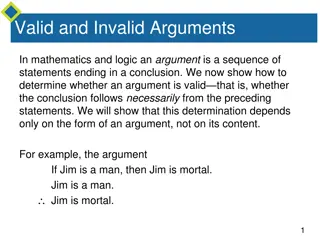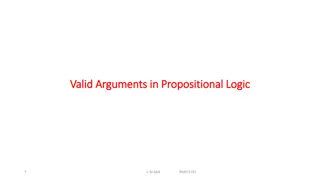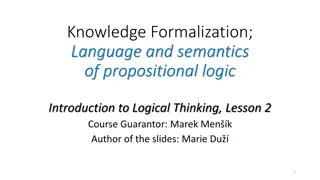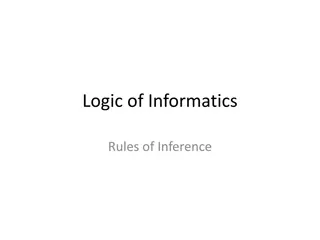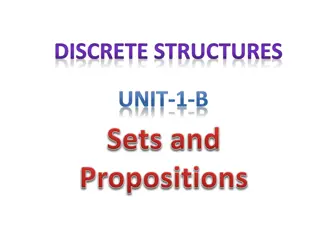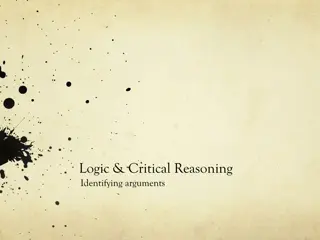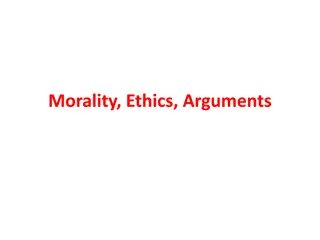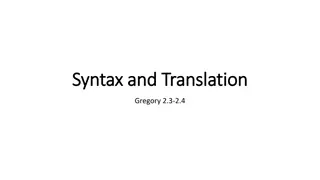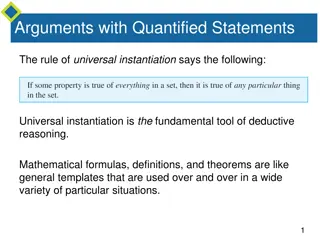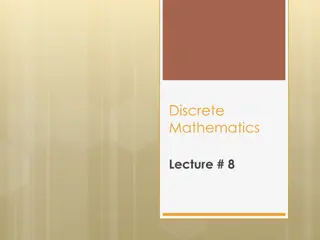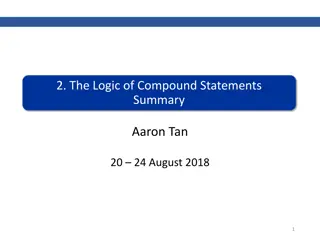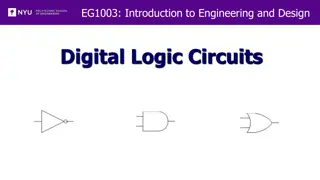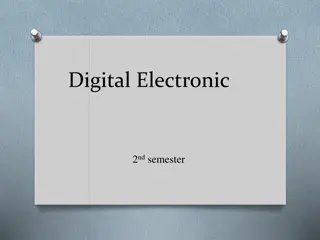Understanding Valid and Invalid Arguments in Logic
In logic, arguments consist of premises supporting a conclusion, with deductive arguments claiming logical necessity. Valid arguments have premises implying the conclusion, making them deductively valid. For example, if all actors are robots and Tom Cruise is an actor, then logically Tom Cruise must be a robot. However, validity does not ensure truth, as seen in the case of Marc speaking English based on being from England. The distinction between sound and unsound arguments lies in the truth of the premises, determining the overall validity of the argument.
Download Presentation

Please find below an Image/Link to download the presentation.
The content on the website is provided AS IS for your information and personal use only. It may not be sold, licensed, or shared on other websites without obtaining consent from the author. Download presentation by click this link. If you encounter any issues during the download, it is possible that the publisher has removed the file from their server.
E N D
Presentation Transcript
VALID VS INVALID VALID VS INVALID Distinguish valid from invalid Distinguish valid from invalid arguments and sound from unsound arguments and sound from unsound
*An argument is a group statements, called premises, offered in support of a conclusion. *A deductive argument claims that its premises support its conclusion by logical necessity. *Logical necessity means this: If you are holding one apple with your right hand and another apple with your left hand, then by logical necessity you are holding two apples. Or *If all objects are things that exist in space-time, then by logical necessity a pizza is an object. Or *If all triangles have three sides, and on page 12 of your geometry book there is a triangle by logical necessity that triangle has three sides.
*What if I told you that Im holding 3 apples or that I ate a pizza that was not an object or that in my book there is a triangle with 5 sides? *That's impossible! It is logically necessary that if you have 2 apples you have 2 apples and that a pizza is an object and that triangles have 3 sides. *But what if I told you that the sun will not rise tomorrow or that we are in the Matrix? Perhaps this sounds absurd. But on closer examination it is not logically necessary that the sun must rise tomorrow or that we are not in the Matrix. It is possible. *So, if something could not be otherwise, it is logically necessary. 3+3 = 6. This could not be otherwise. It is logically necessary.
*If the premises of an argument support the conclusion by logical necessity, the argument is DEDUCTIVELY VALID. *VALIDITY is a property that applies only to deductive arguments. It means that premises support the conclusion by logical necessity. *Another way to put it: The premises IMPLY the conclusion. *So, if the premises of an argument IMPLY the conclusion, that argument is DEDUCTIVELY VALID.
*Consider the following argument: 1. All actors are robots. 2. Tom Cruise is an actor. 3. Therefore, Tom Cruise is a robot. *This is a valid argument. Why? *Assuming that the premises are true, it is impossible for the conclusion to be false. *Just think about it: If premises 1 and 2 were true, could you deny the conclusion? No! *Thus this argument is deductively valid, but UNSOUND.
*Another valid argument: 1. People from England speak English. 2. Marc is from England. 3. Therefore, Marc speaks English. Once again: Assuming that the premises are true, is it possible for the conclusion to be false? No! Again, this is a deductively valid argument and if there is a Marc who is from England, the argument is SOUND.
*What happens when a deductive argument is not successful? *What happens when the premises do not support the conclusion by logical necessity? *What happens, that is, when the premises do not imply the conclusion? *Answer: The argument is INVALID.
*VERY IMPORTANT: The conclusion of an INVALID VERY IMPORTANT: The conclusion of an INVALID argument can be a true statement or a false argument can be a true statement or a false statement! statement! *In fact, an argument can have true premises and a In fact, an argument can have true premises and a true conclusion and still be INVALID! true conclusion and still be INVALID! 1. 1. The president of the US must be born in the US. 2. 2. Donald Trump was born in the US. 3. 3. Therefore, Donald Trump is the president of the US. US. The president of the US must be born in the US. Donald Trump was born in the US. Therefore, Donald Trump is the president of the *I know what you re thinking: But it is true that I know what you re thinking: But it is true that Trump is the president of the US! Trump is the president of the US! *Sure, but it is NOT premise 1 and 2 that make the Sure, but it is NOT premise 1 and 2 that make the statement true! statement true! *VALIDITY AND TRUTH ARE 2 DIFFERENT THINGS! VALIDITY AND TRUTH ARE 2 DIFFERENT THINGS!
*If the premises of a deductive argument fail to support the conclusion, the argument is INVALID *This means that the premises do not support the conclusion by logical necessity. *Another way to put it: The premises do not imply the conclusion.
1. All actors are robots. 2. Tom Cruise is a robot. 3. Therefore, Tom Cruise is an actor. Now think about it: If the premises are true, do they imply the conclusion? Perhaps you want to say: But I know that he is an actor! Sure, but the question is not whether he in fact is an actor. The question is whether premise 1 and 2 IMPLY that Tom Cruise is an actor. And they clearly don t. So, because the premises fail to support the conclusion, this argument is a DEDUCTIVELY INVALID argument.
1. British people speak English. 2. Marc speaks English. 3. Therefore, Marc is British. *Ask yourself: If the premises are true, is it possible for the conclusion to be false? Yes, of course! Marc may have learned to speak English. *The premises do not imply that Marc is British! *Perhaps you say: But Marc could well be British! *Granted, but once again, the question is NOT what could be. The question is whether premises 1 and 2 IMPLY that Marc is British. *It is obvious that they don t.
*Okay! Now youll tell me if the following arguments are valid, invalid, sound, unsound. Remember: Ask yourself, Assuming that the remises are true, does the conclusion follow by logical necessity or does not follow at all?
1.The Pope speaks 13 languages. 2.This man speaks 13 languages. 3.Therefore, this man is the Pope.
1. All female TV hosts are successful TV hosts. 2. Oprah Winfrey is a successful TV host. 3. Therefore, Oprah Winfrey is a female TV host.
*Premise 1 says that all females who are TV hosts are successful. *So, if you are a female, and you are a TV host, you are successful. *However, premise 1 does not assert that ALL TV hosts are females. This implies that there are successful male TV hosts too. *Now, what does premise 2 assert? It asserts that Oprah Winfrey is a successful TV host. But it does not say anything about her sex. *I know what you re thinking: But I know Oprah! She is a female TV host. *Granted, but the question is NOT who Oprah in fact is. *Once again, the question is whether the premises imply the conclusion. *It is a matter of relationship between premises and conclusion, and not between reality and conclusion.
1. Students who received an F pass the course. 2. Philippa received an F. 3. Therefore Philippa passed the course.
1.If you are playing soccer, you have a soccer ball. 2.You have a soccer ball. 3.Therefore you are playing soccer.
1.All trees are plants. 2.This is a plant. 3.Therefore, this is a tree.
1.All plants are green. 2.Trees are green. 3.Therefore, trees are plants.
1.All things with 3 sides are triangles. 2.Some things with 3 angles are triangles. 3.Therefore, some things with 3 angles are things with 3 sides. INVALID
Lets change terms: Things with 3 sides become ants Triangles become insects Things with 3 angles become things that fly
1.All ants are insects. 2.Some things that fly are insects. 3.Therefore, some things that fly are ants.
1.All dogs are cats. 2.Fluffy is a dog. 3.Therefore, Fluffy is a cat.
1.Whatever begins to exist has a cause. 2.The universe began to exist. 3.Therefore, the universe has a cause.
THIS IS THE END Questions?
